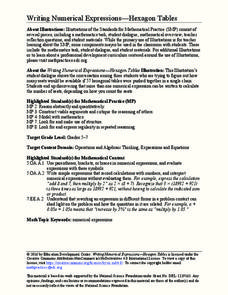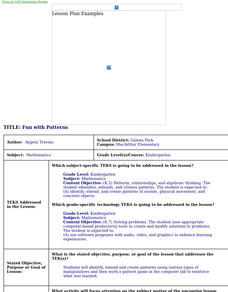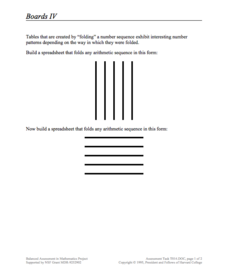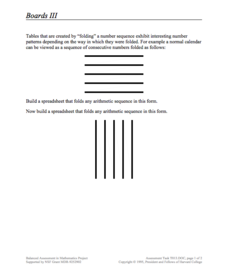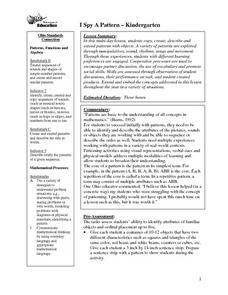Pyro Innovations
Get into Shape
Shapes are so fun! Little ones explore, identify, and create shapes using tangrams or pattern blocks. The activity is intended to stimulate critical thinking while engaging learners through play and shape identification. Each child will...
Curated OER
Numeracy Starters
If you like to start each day with a new math challenge or warm-up, this resource is a must have. It includes 36 slides, each containing a different math challenge that stimulates algebraic reasoning, problem solving, and basic math...
EngageNY
Dividing by (x – a) and (x + a)
Patterns in math emerge from seemingly random places. Learners explore the patterns for factoring the sum and differences of perfect roots. Analyzing these patterns helps young mathematicians develop the polynomial identities.
Education Development Center
Writing Numerical Expressions—Hexagon Tables
Explore a basic pattern to practice writing expressions. In collaborative groups, learners examine a contextual pattern and write an expression to model it. The task encourages groups to describe the pattern in multiple ways.
EngageNY
Why Do Banks Pay YOU to Provide Their Services?
How does a bank make money? That is the question at the based of a lesson plan that explores the methods banks use to calculate interest. Groups compare the linear simple interest pattern with the exponential compound interest pattern.
Noyce Foundation
Double Down
Double the dog ears, double the fun. Five problems provide increasing challenges with non-linear growth. Topics include dog ears, family trees and population data, and geometric patterns.
Curated OER
Patterns
Learners identify patterns in equations. In this algebra lesson, students write equations of problems with recurring patterns. They relate and model real life situation using functions.
Curated OER
Patterns
In this Algebra I worksheet, 9th graders explore number and geometric patterns and use the Sieve of Eratosthenes to find the prime numbers less than one hundred. The six page worksheet contains eight multipart questions. Answers are...
Curated OER
Algebra on the Farm
Students develop algebraic equations to solve problems involving farm animals. They watch a video, use manipulatives to determine the number of birds and pigs on the farm, and create original problems for their classmates to solve.
Curated OER
National Symbol Patterns
Students practice their patterning skills using national symbols.
Curated OER
Extending Geometric and Numeric Patterns
Young scholars study patterns. They construct growing patterns using pattern blocks and isosceles right triangles. They verbally describe the patterns and state the rule that describes the relationship involving the number of pattern...
Curated OER
Repeating Patterns
Students explore growth patterns by using manipulatives such as pattern blocks, investigate growth pattern of pattern, record growth in T-chart, describe how pattern is growing, and predict number of blocks needed to extend pattern.
Curated OER
Fun with Patterns
Students identify, extend and create patterns using various types of manipulatives and then work a pattern game in the computer lab to reinforce what was learned.
Curated OER
Using Numbers Everywhere
Kindergarteners explore various representations and uses of numbers to develop number sense. They participate in an activity and arrange patterns into groups. Students compare the sets and describe the objects in each set.
Concord Consortium
Boards IV
Build a connection between algebraic sequences and spreadsheets. Learners examine a specific folding pattern and convert the pattern into a spreadsheet. The goal of the spreadsheet is to produce a sequence of a specific pattern modeled...
Concord Consortium
Boards III
Learn to visualize mathematical patterns as a folded pattern. Beginning with a visual display, the task encourages pupils to view sequences as a folded table. The pattern of the table then becomes a formula in a spreadsheet that...
Curated OER
9th Grade Transition Algebra
Ninth graders examine mathematical patterns. In this algebra lesson, 9th graders collaborate to think outside the box and share solutions to problems they have encountered. Students use popsicle sticks to solve various building problems...
Curated OER
Problem Solving Patterns
In this problem solving patterns worksheet, 6th graders solve and complete 2 various types of problems. First, they identify what the 4n represents in each block pattern illustrated. Then, students determine the number of arrows added to...
Curated OER
2, 4, 6, 8 . . .What Do We Appreciate-Patterns, Patterns, Patterns
Students discover and predict patterns in a numerical sequence. Through the Internet and video segments, students begin with basic number patterns and extend their knowledge into higher math skills. They will also create new patterns...
Curated OER
2, 4, 6, 8 . . .What Do We Appreciate-Patterns, Patterns, Patterns
Students recognize patterns in a numerical sequence, create new patterns and predict outcomes to established sequences.
Curated OER
Leaf Patterns
First graders explore the existence of patterns in everyday items. In this science and math integrated lesson, 1st graders match leaves with a name word card and organize them into four patterns. This lesson includes a reading of And the...
Curated OER
Patterns in Pascal's Triangle
Students examine the patterns that exist in Pascal's Triangle. They explore multiples and factors. Sudents use an applet to create and color the multiples in Pascal's Triangle.
Curated OER
Mother Nature Pattern Maker
Students in a teacher education program enhance their awareness of patterns. They discover how to support their students in developing this skill in mathematical terms. They role play the role of a K-2 student and collect images from...
Curated OER
I Spy a Pattern-Kindergarten
Students copy, create, describe, and extend patterns with objects. They explore a variety of patterns through the use of manipulatives, sound, rhythms, songs and movement. Cooperative processes are used to encourage partner discussion.





